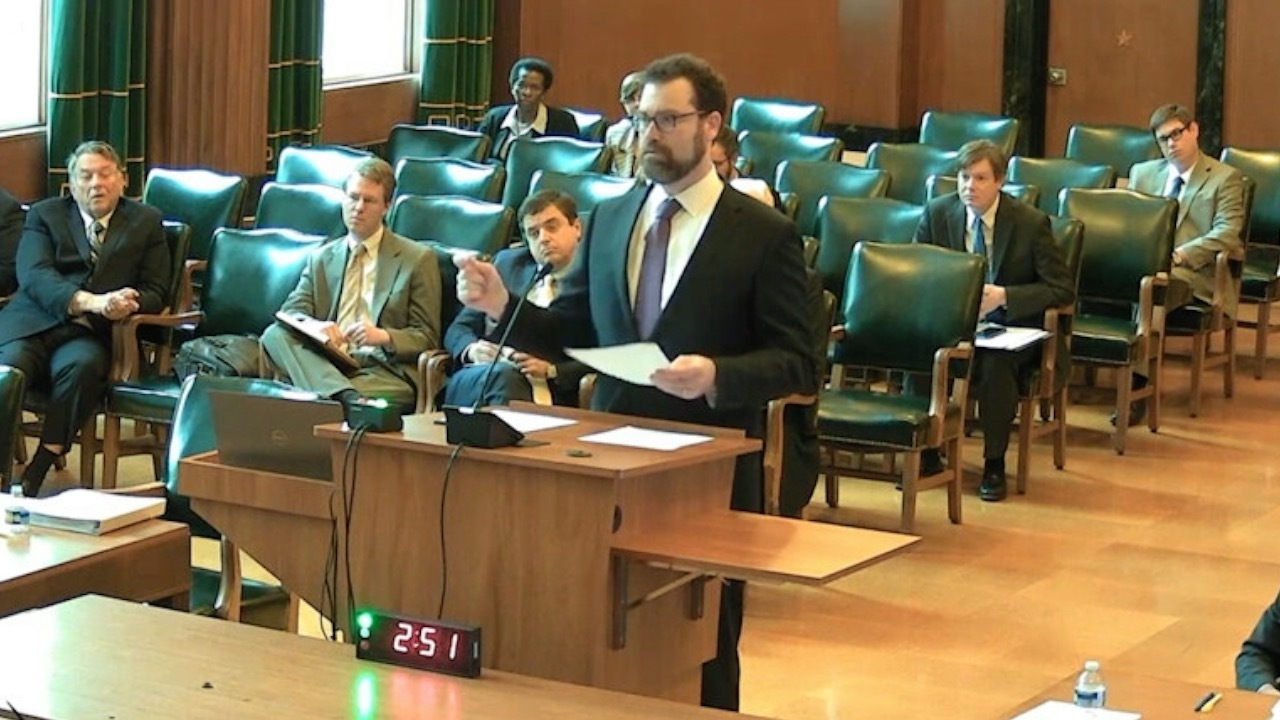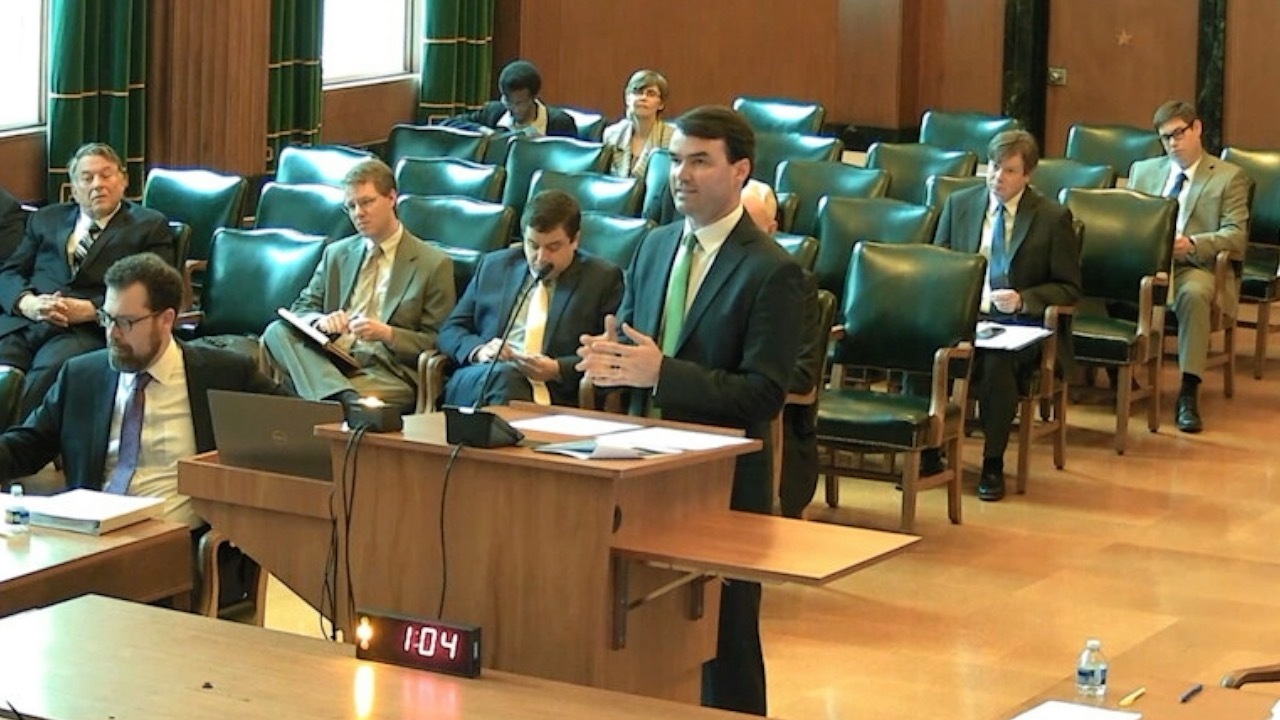- The North Carolina Supreme Court will decide in the months ahead whether Wake Forest had authority to reject a proposed charter school in 2020 because the school's plans failed to meet the town's sidewalk requirements.
- Developer Schooldev East argues that Wake Forest raised the objections about sidewalks only at the end of the approval process.
- Wake Forest accuses Schooldev of misapplying a state law limiting local governments' ability to require street improvements for new schools.
North Carolina’s highest court will decide in the months ahead whether the town of Wake Forest could use a sidewalk requirement to reject a proposed charter school in 2020. The topic generated an hour of oral arguments Tuesday at the state Supreme Court.
The outcome of the legal dispute is unlikely to affect the school, which chose a different location after losing an earlier round in the courtroom battle.
Wake Forest rejected the school in October 2020. Town officials cited developers’ failure to plan for sidewalks that would meet town requirements for pedestrian connectivity with surrounding neighborhoods.
“This was a case where the politics of charter schools swirled around it,” said Toby Coleman, the lawyer representing school developer Schooldev East. Discussion among Wake Forest leaders during the 2020 hearing that led to the school’s rejection included concerns about charter schools and their potential impact.

“The town says there was no latent bias in its decision,” Coleman said. Wake Forest pointed instead to a violation of the sidewalk ordinance. School plans called for one 10-foot multiuse path leading to a nearby subdivision. Schooldev did not plan for sidewalks leading to other neighborhoods.
“The problem with that argument is that at no point prior to the close of the evidentiary hearing in this quasi-judicial case did anybody tell Schooldev that that was required by the sidewalk ordinance,” Coleman said. “In fact, nobody from the town mentioned the sidewalk ordinance during the evidentiary hearing.”
“The town, if it had wanted sidewalks, it should have told Schooldev that it wanted the sidewalks,” Coleman said.
On Wake Forest’s side of the argument, lawyer Sam Slater accused Schooldev of relying on a “novel North Carolina statute to justify its lack of pedestrian and bicycle connectivity.”

“The one thing the town raised their hand and said: If you’re going to put a school in the rural holding district, this is what it needs to do,” Slater said. “It needs to achieve the connectivity to the surrounding areas. It’s in a place with steep slopes. We’re in a rural part of town. We want school children walking.”
Chief Justice Paul Newby criticized Wake Forest’s decision to raise the sidewalk concerns at the end of the process.
“How is that not just totally blindsiding an applicant?” he asked Slater. “To have the town employees say throughout the process, what you’re doing is OK. You appear at a hearing. There’s no evidence to the contrary. Why is that a fair process to then let anyone else … go in and say, ‘Oh, by the way, we’re going to deny these permits’?”
Justice Richard Dietz suggested that Wake Forest’s rules were unclear.
“it’s your property, and the baseline is you can do whatever you want on your property,” Dietz said to Coleman. “If the government wants to limit that, it’s their obligation to make clear rules. It seems like what’s going on here is there are not very clear rules. What your client presented as a proposal checks all the boxes of the current ordinances.”
Addressing Slater, Dietz said, “The problem is if we’re in the middle, and there’s some ambiguity, your client loses because there’s an obligation for you to be clear in drafting zoning ordinances.”
The court’s two Democratic justices offered some support to Wake Forest’s case.
“The trial court found as fact the site plan rendering itself did not show pedestrian and bicycle connectivity with surrounding neighborhoods to the west, north, and east,” said Justice Anita Earls. “Isn’t that a finding of fact that we have to accept?”
Justice Allison Riggs challenged the argument that Schooldev met its obligation by planning a single sidewalk connecting to a neighborhood south of the school. “Wouldn’t your argument then really, really undermine what the town has set as its law and its policy about promoting accessibility?”
Schooldev is asking the state’s highest court to reverse a 2-1 decision from the state Court of Appeals in 2022. The state Supreme Court agreed to take the case in April 2023.
In November 2019, developers submitted plans to Wake Forest that included Wake Preparatory Academy, a proposed K-12 charter school. Wake Forest officials rejected the plans in October 2020, citing concerns about a lack of pedestrian and bicycle “connectivity to adjoining neighborhoods.”
“Appellant Schooldev East, LLC, the developer of a proposed new school in the Town of Wake Forest, relied on a novel North Carolina statute, N.C.G.S. § 160A-307.1, to justify its scarce provision of pedestrian and bicycle infrastructure within its proposed subdivision and site plan,” according to an October 2023 brief from lawyers representing Wake Forest. “The Town denied Schooldev’s subdivision application and site plan application for failure to provide sufficient pedestrian and bicycle infrastructure, as required by § 3.7.5 of the Town’s Unified Development Ordinance.”
“Schooldev, in arguments before the Wake County Superior Court, the North Carolina Court of Appeals, and now this Court, has continued to rely on N.C.G.S. § 160A-307.1 to claim that its permit applications were wrongfully denied. Schooldev’s arguments are unavailing,” Wake Forest’s brief continued.
Schooldev’s arguments in the case attracted legal support from both the North Carolina Home Builders Association and the North Carolina Coalition of Charter Schools.
Wake County Superior Court Judge Vince Rozier upheld the town’s decision rejecting the charter school in April 2021.
Wake Prep eventually chose another location in an existing building on Capital Boulevard in Youngsville. But an Appeals Court panel ruled unanimously in July 2022 that Wake Forest could not have the lawsuit tossed out as moot.
Judges Jeff Carpenter and John Arrowood still ruled in favor of town officials. “[W]e conclude Petitioner failed to present competent, material, and substantial evidence” to get necessary development permits “because the evidence did not satisfactorily show Petitioner met the Town’s ordinances requiring pedestrian connectivity to surrounding residential areas and accessibility by schoolchildren to the school,” Carpenter wrote.
Judge John Tyson dissented. He cited Wake Forest’s decision to ignore plans “to build a 10-foot-wide multi-use path along the front of the property, inside the public right of way.” That path “would be for pedestrians and cyclists to use as a public sidewalk and path to a neighborhood located at the property’s southern point.”
“The Commissioners violated their oath to be an impartial decision maker in a quasi-judicial proceeding,” Tyson wrote. “The decision must be based solely on the evidence presented. The Board ignored the evidence and merely substituted their subjective and unqualified hunches and notions to place an unlawful burden of persuasion upon Petitioner. This they cannot lawfully do.”
Appellate judges disagreed about the proper application of a state law, N.C. General Statute § 160A-307.1. It limits city government requirements for “street improvements related to schools.”
Carpenter and Arrowood did not believe the law limited Wake Forest’s requirements in the Wake Prep case. Tyson disagreed.
“The Town cannot require more as a condition of development approval unless they are ‘required for safe ingress and egress to the municipal street system and that are physically connected to a driveway on the school site,’” Tyson wrote. This limiting language of the statute could not be plainer.”